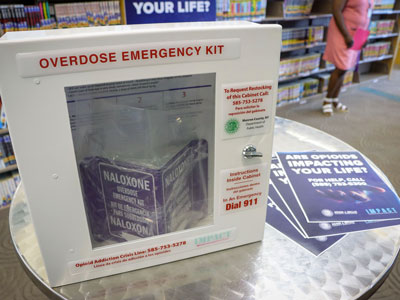July 21st, 2022

New 24-hour opioid hotline number, IMPACT vehicle & ad campaign announced
Spanish Language Version (PDF)
Monroe County Executive Adam Bello today announced the expansion of Monroe County’s efforts to stem opioid and fentanyl addiction and prevent opioid overdose-related fatalities. The efforts include installing naloxone, the generic form of Narcan, in special cabinets at types of community and business locations where opioid and fentanyl overdoses are more likely to occur, a new 24-hour opioid hotline, a dedicated vehicle for the county’s Improving Addiction Coordination Team (IMPACT) and a countywide ad campaign for public awareness.
Each naloxone cabinet contains 12 doses of life-saving naloxone nasal spray along with instructions on how to administer naloxone to someone who has overdosed on opioids. Using data collected by IMPACT, the first phase of the naloxone program has 50 cabinets being installed today at types of community sites and businesses that see the most overdoses countywide – including motels, gas stations, small retail businesses and convenience stores.
“All of our efforts to stem the opioid epidemic begin with saving lives,” said County Executive Adam Bello. “IMPACT has already distributed more than 3,500 doses of naloxone to the community but more is needed. The naloxone cabinets will be immediately accessible when there is an overdose at or near types of businesses and establishments often frequented by those using opioids and fentanyl. Once a death is prevented, IMPACT can help connect the individual with addiction support and treatment.”
Naloxone rapidly reverses an opioid overdose by blocking the effects of opioids on the brain and restoring normal breathing. Naloxone will only work if a person has opioids in their system and will not work on any other drugs. The county is ordering an additional 500 naloxone cabinets and is working with the community and businesses to locate and install them. The county will also restock the boxes when needed.
The new opioid hotline number, (585) 753-5300, is staffed by IMPACT clinicians 24-7, including weekends and holidays. The hotline connects callers with crisis services, support, naloxone deliveries and training as well as support for families impacted by opioids. The new hotline is being promoted on various billboards, posters and social media. A specially wrapped IMPACT vehicle will be used for outreach and education daily.
“Opioid and fentanyl addiction is a family disease — it affects more than just the individual using drugs. The families of individuals caught in opioid addiction also suffer and need support,” said County Executive Bello. “The hotline can provide help and support for individuals and families impacted by opioids and fentanyl addiction.”
In addition to announcing the new hotline and naloxone cabinet initiative, County Executive Bello updated the community on his administration’s opioid response and actions.
Since taking office in January of 2019, the Bello administration:
-
Hired Dr. Tisha Smith, the county’s first Director of Addiction Services
-
Created IMPACT with outreach coordinators who work directly with individuals and the families of individuals struggling with substance abuse disorder
-
Proposed and passed Maisie’s Law, which requires pharmacies to provide a public health notice and information about naloxone with each new opioid prescription filled
-
Created a “lock box” opioid trust fund to guarantee that the tens of millions in opioid settlement funds are spent to prevent addiction and combat the opioid crisis
-
Expanded IMPACT to a staff of 22, with regular operating hours from 7 a.m. to 11 p.m. and on- call outreach available from 11 p.m. to 7 a.m.
Since IMPACT began operation, the team has:
-
Visited more than 500 homes and had contact with more than 350 opioid overdose survivors
-
Conducted regular street outreach in areas of significant drug use, building relationships with users and providing kits that include naloxone and information on recovery services
-
Distributed more than 3,500 naloxone doses
-
Trained more than 800 employees of Monroe County, community groups, businesses, RCSD and library staff on administering naloxone
-
Began training inmates in the Monroe County jail on Narcan use and giving naloxone to each prisoner released from jail













